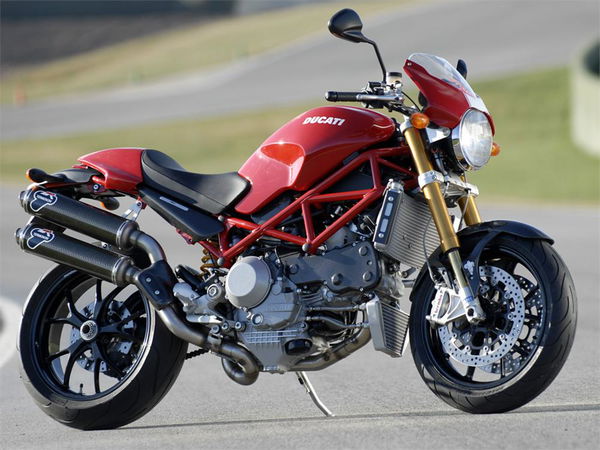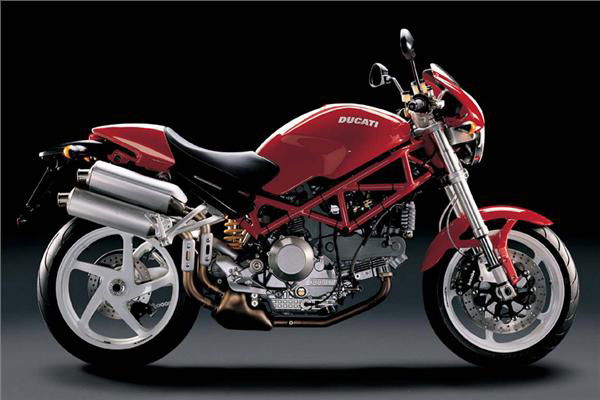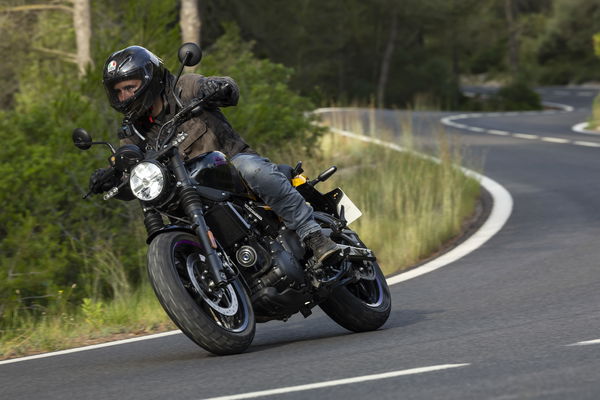S4RS Monster Testastretta (2006 - 2008) review
The latest incarnation of the Monster gets a 999 130bhp engine and a chassis to match any superbike. Wide bars, wide attitude, wide grin

The first Monster I ever rode was, in fact, the first Monster. I rode it at the launch back in 1993, and didn't I give it a good start in life? I loved it - big fun, big wheelies, guaranteeing a great write-up.
At the time though, it offended the Italian press. It wasn't a proper Ducati and ignored the marque's sporting heritage. "Eet looks like a crashed 851," was the comment. Angel Galluzzi, designer for Ducati at the time, was a bear of a man and looked rather silly on the dinky Monster. That name, he explained, was a bit of an in-joke - a nod to Frankenstein's pragmatic approach to creation. I told him it looked great and they'd sell shed-loads. And I was right: 170,000 to date, as it turns out, and the design has become a classic. And back in '93, while I was busy hoisting mothers in northern Italy, Giulio Malagoli was applying to the University of Modena to study mechanical engineering, oblivious to our vaguely entwined destinies.
Thirteen years later he was making me feel very old, this 31-year-old project manager of the latest and largest iteration of Ducati Monster, the S4Rs Testastretta. Giulio was explaining why it came to be. "The only original part from the first Monster is the seat cover," he was saying.
It may be true, but we were talking about the same bike in more than profile. "That Monster started everything," he said. "Every manufacturer now makes naked bikes, but the Monster was the first. So we want this to be the best naked, with the highest performance." Ah, I thought, big fun, big wheelies. Ducati took its inspiration for the Monster from the streetfighter - big old GSX-R11s with Renthal bars, but the S4Rs is built to handle too. For anyone considering a jump from a super-focused supersport, this is a great way to go.
The motor is the Testastretta 999, the unit used in the 999S superbike; the previous eight-valve Monster, the S4R, used the old generation 998 engine. Testastretta - 'narrow head' - refers to the narrow valve angle, which creates a compact, cleaner and therefore more efficient combustion chamber, while flat crown pistons produce a smooth and linear flame front. The Marelli fuel injection system uses race-derived 12-hole injectors and adds to a powerful and totally smooth delivery, giving you glitch-free throttle control.
The performance refinements pervade the bike: brakes are from the 999R, it has Marchesini alloy wheels and …hlins 43mm forks almost identical to the 999R's.
The S4Rs is a well finished motorcycle. Naked bikes can show too much and, conscious of this, the loom and cables have been hidded. But the Testastretta engine isn't the most beautiful thing. It lacks shape and definition. Ducati has done what it can - a carbon cam belt cover for example - but the motor was designed for function, not form and to be hidden behind a fairing. Otherwise, styling and finish is hard to fault.
The venue for the launch was a circuit. I prefer a mix of track and road, for obvious reasons, but we were confined to the Ascari Race Resort near Ronda in southern Spain. In many ways though, this bike, with its spec sheet reading like a full-house superbike, is well suited to the track.
I was comfortable straight away. The wide, high bars put you in the classic 'proper motorbike' posture. That said, the stacked exhausts touched my right heel; it didn't interfere with my riding, but it did melt my boot. Throttle, clutch and brakes are light and finely metered, connecting intimately with the more critical functions. The 999 motor is a gem, providing a gravelly delivery of flowing power which pushes you on in any gear, hauling you out of trouble with muscley torque and then catapulting you down the straights till you bounce off the 10,500rpm limiter. It's a rush. Wheelie? Try one in second gear.
The brakes are phenomenal, almost too much. They're Brembo four-pot radial calipers on 320mm discs, straight from the 999R. They're progressive at first, then bite like a pit bull. From high speed this equates to huge stopping power and show the class of the Ohlins forks. Ascari race track is 5.4km of flowing curves, many reminiscent of famous corners from tracks around the world. The S4Rs was an easy bike to take around them all. Only where fast direction changes were necessary would the bike feel light at the front, the bars floating for a second before settling down. A good test of stability under pressure was the last corner, a huge sweeping bend a bit like Monza's Parabolica, but faster in. It would hold a steady line all the way, with perhaps a slight shimmy of the bars from the last upchange.
The only frustration was that we were confined to the track. It dealt with that brilliantly and I couldn't find anything that could potentially compromise road performance. We'll see. What I can be sure of is that the S4Rs is exactly what it set out to be in terms of outright high performance - the ultimate Monster.
Read more: http://www.visordown.com/reviews/motorcycles/naked/ducati-s4rs/review/298.html#ixzz0zQDV0LST
The first Monster I ever rode was, in fact, the first Monster. I rode it at the launch back in 1993, and didn't I give it a good start in life? I loved it - big fun, big wheelies, guaranteeing a great write-up.
At the time though, it offended the Italian press. It wasn't a proper Ducati and ignored the marque's sporting heritage. "Eet looks like a crashed 851," was the comment. Angel Galluzzi, designer for Ducati at the time, was a bear of a man and looked rather silly on the dinky Monster. That name, he explained, was a bit of an in-joke - a nod to Frankenstein's pragmatic approach to creation. I told him it looked great and they'd sell shed-loads. And I was right: 170,000 to date, as it turns out, and the design has become a classic. And back in '93, while I was busy hoisting mothers in northern Italy, Giulio Malagoli was applying to the University of Modena to study mechanical engineering, oblivious to our vaguely entwined destinies.
Thirteen years later he was making me feel very old, this 31-year-old project manager of the latest and largest iteration of Ducati Monster, the S4Rs Testastretta. Giulio was explaining why it came to be. "The only original part from the first Monster is the seat cover," he was saying.
It may be true, but we were talking about the same bike in more than profile. "That Monster started everything," he said. "Every manufacturer now makes naked bikes, but the Monster was the first. So we want this to be the best naked, with the highest performance." Ah, I thought, big fun, big wheelies. Ducati took its inspiration for the Monster from the streetfighter - big old GSX-R11s with Renthal bars, but the S4Rs is built to handle too. For anyone considering a jump from a super-focused supersport, this is a great way to go.
The motor is the Testastretta 999, the unit used in the 999S superbike; the previous eight-valve Monster, the S4R, used the old generation 998 engine. Testastretta - 'narrow head' - refers to the narrow valve angle, which creates a compact, cleaner and therefore more efficient combustion chamber, while flat crown pistons produce a smooth and linear flame front. The Marelli fuel injection system uses race-derived 12-hole injectors and adds to a powerful and totally smooth delivery, giving you glitch-free throttle control.
The performance refinements pervade the bike: brakes are from the 999R, it has Marchesini alloy wheels and …hlins 43mm forks almost identical to the 999R's.
The S4Rs is a well finished motorcycle. Naked bikes can show too much and, conscious of this, the loom and cables have been hidded. But the Testastretta engine isn't the most beautiful thing. It lacks shape and definition. Ducati has done what it can - a carbon cam belt cover for example - but the motor was designed for function, not form and to be hidden behind a fairing. Otherwise, styling and finish is hard to fault.
The venue for the launch was a circuit. I prefer a mix of track and road, for obvious reasons, but we were confined to the Ascari Race Resort near Ronda in southern Spain. In many ways though, this bike, with its spec sheet reading like a full-house superbike, is well suited to the track.
I was comfortable straight away. The wide, high bars put you in the classic 'proper motorbike' posture. That said, the stacked exhausts touched my right heel; it didn't interfere with my riding, but it did melt my boot. Throttle, clutch and brakes are light and finely metered, connecting intimately with the more critical functions. The 999 motor is a gem, providing a gravelly delivery of flowing power which pushes you on in any gear, hauling you out of trouble with muscley torque and then catapulting you down the straights till you bounce off the 10,500rpm limiter. It's a rush. Wheelie? Try one in second gear.
The brakes are phenomenal, almost too much. They're Brembo four-pot radial calipers on 320mm discs, straight from the 999R. They're progressive at first, then bite like a pit bull. From high speed this equates to huge stopping power and show the class of the Ohlins forks. Ascari race track is 5.4km of flowing curves, many reminiscent of famous corners from tracks around the world. The S4Rs was an easy bike to take around them all. Only where fast direction changes were necessary would the bike feel light at the front, the bars floating for a second before settling down. A good test of stability under pressure was the last corner, a huge sweeping bend a bit like Monza's Parabolica, but faster in. It would hold a steady line all the way, with perhaps a slight shimmy of the bars from the last upchange.
The only frustration was that we were confined to the track. It dealt with that brilliantly and I couldn't find anything that could potentially compromise road performance. We'll see. What I can be sure of is that the S4Rs is exactly what it set out to be in terms of outright high performance - the ultimate Monster.
Read more: http://www.visordown.com/reviews/motorcycles/naked/ducati-s4rs/review/298.html#ixzz0zQDV0LST
The first Monster I ever rode was, in fact, the first Monster. I rode it at the launch back in 1993, and didn't I give it a good start in life? I loved it - big fun, big wheelies, guaranteeing a great write-up.
At the time though, it offended the Italian press. It wasn't a proper Ducati and ignored the marque's sporting heritage. "Eet looks like a crashed 851," was the comment. Angel Galluzzi, designer for Ducati at the time, was a bear of a man and looked rather silly on the dinky Monster. That name, he explained, was a bit of an in-joke - a nod to Frankenstein's pragmatic approach to
creation. I told him it looked great and they'd sell shed-loads. And I was right: 170,000 to date, as it turns out, and the design has become a classic.
And back in '93, while I was busy hoisting mothers in northern Italy, Giulio Malagoli was applying to the University of Modena to study mechanical engineering, oblivious to our vaguely entwined destinies.
Thirteen years later he was making me feel very old, this 31-year-old project
manager of the latest and largest iteration of Ducati Monster, the S4Rs Testastretta. Giulio was explaining why it came to be. "The only original part from the first Monster is the seat cover," he was saying.
It may be true, but we were talking about the same bike in more than profile. "That Monster started everything," he said. "Every manufacturer now makes naked bikes, but the Monster was the first. So we want this to be the best naked, with the highest
performance." Ah, I thought, big fun, big wheelies. Ducati took its inspiration for the Monster from the streetfighter - big old GSX-R11s with Renthal bars - but the
S4Rs is built to handle too. For anyone considering a jump from a super-focused supersport, this is a great way to go.
The motor is the Testastretta 999, the unit used in the 999S superbike; the
previous eight-valve Monster, the S4R, used the old generation 998 engine. Testastretta - 'narrow head' - refers to the narrow valve angle, which creates a compact, cleaner and therefore more efficient combustion chamber, while flat crown pistons produce a smooth and linear flame front. The Marelli fuel injection system uses race-derived 12-hole injectors and adds to a powerful and totally smooth delivery,
giving you glitch-free throttle control.
The performance refinements pervade the bike: brakes are from the 999R, it has Marchesini alloy wheels and …hlins 43mm forks almost identical to the 999R's.
The S4Rs is a well finished motorcycle. Naked bikes can show too much and,
conscious of this, the loom and cables have been hidded. But the Testastretta engine isn't the most beautiful thing. It lacks shape and definition. Ducati has done what it can - a carbon cam belt cover for example - but the motor was designed for function, not form and to be hidden behind a fairing. Otherwise, styling and finish is hard to fault.
The venue for the launch was a circuit. I prefer a mix of track and road, for obvious reasons, but we were confined to the Ascari Race Resort near Ronda in southern Spain. In many ways though, this bike, with its spec sheet reading like a full-house
superbike, is well suited to the track.
I was comfortable straight away. The wide, high bars put you in the classic 'proper motorbike' posture. That said, the stacked exhausts touched my right heel; it didn't interfere with my riding, but it did melt my boot. Throttle, clutch and brakes are light and finely metered, connecting intimately with the more critical functions. The 999 motor is a gem, providing a gravelly delivery of flowing power which pushes you on in any gear, hauling you out of trouble with muscley torque and then catapulting you down the straights till you bounce off the 10,500rpm limiter. It's a rush. Wheelie? Try one in second gear.
The brakes are phenomenal, almost too much. They're Brembo four-pot radial
calipers on 320mm discs, straight from the 999R. They're progressive at first, then bite like a pit bull. From high speed this equates to huge stopping power and show the class of the …hlins forks.
Ascari race track is 5.4km of flowing curves, many reminiscent of famous
corners from tracks around the world. The S4Rs was an easy bike to take around them all. Only where fast direction changes were necessary would the bike feel light at the front, the bars floating for a second before settling down. A good test of stability under pressure was the last corner, a huge sweeping bend a bit like Monza's Parabolica, but faster in. It would hold a steady line all the way, with perhaps a slight shimmy of the bars from the last upchange.
The only frustration was that we were confined to the track. It dealt with that
brilliantly and I couldn't find anything
that could potentially compromise road performance. We'll see. What I can be sure of is that the S4Rs is exactly what it set out to be in terms of outright high performance - the ultimate Monster.











